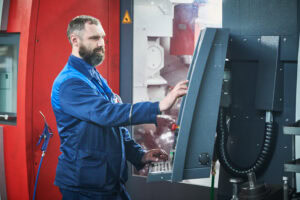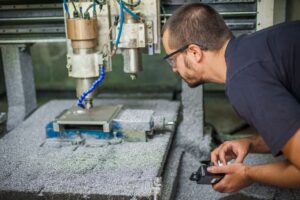A lot of engineers and designers assume that all of their parts need to be outsourced to a machine shop if they want CNC-machined units. Although that’s commonly the case, is it always the case? What’s stopping you from buying a CNC machine and handling some or all of your manufacturing in-house?
In this guide, we’ll explain it all. You’ll learn how much a CNC machine costs, why it’s uncommon for engineering departments to have their own, and some scenarios where it actually makes sense to own your own machine instead of outsourcing. A special thanks to our expert machinists at Rapid Axis for putting this guide together.
How Much Does a CNC Machine Cost?
Let’s start with the simple question: how much does a CNC machine cost? Just like any other piece of equipment or machinery, there’s a massive range.
We like to think about CNC machines just like buying a car. You can get a used Civic for a few thousand, or you can buy a new Ferrari for half a million dollars. In reality, the pricing isn’t too far off.
For entry-level machines that are limited in their functions, you will spend between $5,000 and $50,000. These machines are good enough to do a lot of standard machining, but they can’t handle super complicated projects. Plus, every machine in this category is going to be a 3-axis CNC machine. Honestly, this is where most engineers and designers would land if they were trying to bring a CNC machine in-house.
Stepping up a category, you can find higher-quality and more functional CNC machines between $50,000 to $200,000 that can handle most of the needs of any small or medium business. They typically include added levels of automation, better precision, larger working areas, and a more refined overall operation.
At the top of the line, you’ll find industrial-grade CNC machines like the ones we have in our machine shop. These are 4-axis and 5-axis machining centers that start at around $500,000 and can go much higher than that. These machines are almost exclusively reserved for full-time machine shops that have to handle really intricate projects and a lot of work each week.
Factors That Affect CNC Machine Cost
We just said that CNC machine costs can range from $5,000 to $500,000+, which seems insane. What factors go into the cost of these machines? Let’s discuss that as well as some ongoing costs you might run into if you bring in a CNC machine.
Machine Size and Capabilities
The price of your machine is directly linked to its size and capabilities. Every time you add an axis or an inch of working space, you bring the price up. For instance, a small 2-axis milling machine is inexpensive, while a massive 5-axis CNC machine center can be upwards of a million dollars.
For that reason, we suggest getting the smallest and most rudimentary CNC machine that your operation needs. There’s nothing wrong with a little 3-axis mill that can handle your projects without blowing your budget.
After all, you can still outsource your large and complicated projects to Rapid Axis.
Advanced Features
Different CNC machines come with different suites of advanced features. Different levels of automation and the ability to hit tighter tolerances always comes with a higher price tag. It’s no different than buying a new car with all the bells and whistles — every bell and whistle costs you something.
Brand Reputation
There are dozens of different CNC machine brands on the market. They range anywhere from budget-friendly options that lack a lot of quality to high-precision machines that stand in a league of their own.
These brands earn a reputation through years of people buying their machines and talking to other machinists — you’d be surprised, but the world of machining can be pretty small and tight-knit.
Brands with strong reputations like Haas and Mazak have become the go-to for so many machinists. They are reliable, hard-working, and even their used machines are impressive. Of course, you have to pay more for these brands for the same reasons.
Maintenance and Operational Costs
Stepping away from upfront machine costs, you should also realize that running a CNC machine is no easy feat. You need a trained machinist or some level of training for your staff. In addition, CNC machines break down from time to time, and they need standard maintenance to keep them running.
You’ll need to use and replace cutting tools as they wear out, and so many projects require specialty cutters that you’ll also need to buy. All of these tools start adding up quickly to the overall price of running your CNC machine.
Software and Training Costs
CNC machines also come with different programs you might need to purchase in order to automate the machine. Plus, you’ll need to spend time and money training all of your users on the program or machine that you’re using.
Should You Buy or Outsource CNC Machining?
Before giving you a definite answer, let’s consider some pros and cons of buying and outsourcing your CNC machining work.
Pros of Buying a CNC Machine
- More control of your parts. The main reason why a company buys a simple CNC machine is to get more control over their parts. With an in-house machine, you control everything that goes into the machine and comes out of it.
- Faster turnarounds and lower costs. If your engineers and designers are running the machine, then each project is effectively free and can be done as quickly as possible.
- Easy access for small projects. Quickly turning a part or adjusting a bracket can take a matter of minutes instead of days if you were to outsource the same part.
Cons of Buying a CNC Machine
- Major upfront cost. CNC machines can be incredibly expensive to buy, get delivered, and set up. This is the main reason why people shy away from getting their own CNC.
- Dangerous machine requires a lot of training. A wrong move can result in a life-changing injury for anyone using a CNC machine. This is why safety and training are crucial, and it should be a scary experience for any beginner using a CNC machine.
- Lots of hidden long-term costs. Running a CNC machine long-term comes with countless reasons you need to spend money. From staffing to material costs and tooling, you’ll almost always have something else to buy for your machine.
- They take up a ton of space. These machines can be huge, and they require a lot of empty floor space around them to effectively use. Not to mention, you need extra space for stock material to be stored and extra cutting tools.
Pros of Outsourcing CNC Machining
- You know you’ll get the best results. With a team like Rapid Axis, all of your outsourced CNC work will be better than anything you can put together in-house without a professional machinist. Remember, we have dozens of highly-trained machinists and incredibly expensive high-precision CNC machines to work with.
- Scale production easily. With us, you can go from a prototype to a mass-produced item in the snap of a finger. Scaling a project in-house will take more machinery, more people, more space, and a lot more money.
- Fewer things to worry about going wrong. Since we have extensive experience with CNC machines, there’s a lot less that can go wrong when you outsource your work through our team.
- Unlock additional finishing steps. Not only do we handle CNC machining, but we also offer a lot of different finishing steps to make sure your parts turn out perfectly. We can polish, anodize, powder coat, sandblast, and we can do much more.
- Handle non CNC-related manufacturing. If your project also calls for urethane casting, 3D printing, injection molding, or sheet metal work, we can handle it. All of these extra manufacturing steps require additional machinery, equipment, and expertise. If you try to handle it all in-house, you’ll quickly turn into a full-scale machine shop after spending hundreds and hundreds of thousands of dollars.
Cons of Outsourcing CNC Machining
- Typically costs more per unit. Of course, outsourcing always means spending more for the same amount of work. However, when you outsource the work you don’t need to buy your own machines and warehouse to run the machines, so it can also save you money.
- Requires finding a high-quality shop. Shopping around for the right machine shop can be a daunting task for most people. If you want to get the best results without wasting time looking further, you can always use our experts at Rapid Axis.
- Reliant on their workload and pricing. You’re always reliant on how busy the shop is and what their pricing scheme is. At Rapid Axis, our facility is big enough to handle your projects without a major delay, and you never have to overpay for our services.
So, should you buy or outsource a CNC machine? In almost every case, it’s better to outsource your work and rely on experts. Unless you’re planning on putting together a small machine shop, you’ll quickly realize that you don’t have the capabilities to complete each of your projects and you’ll wind up outsourcing a lot of work anyway.
The only exception to this rule is a team of engineers who wants to bring in a small, used, 3-axis CNC milling machine to handle some of their little side projects. Still, there are a lot of ongoing costs that you need to get ready for.
How to Decide on the Best CNC Machine Option for Your Business
If you decide to buy your own CNC machine, there are some considerations to think through.
For starters, put together a budget. How much can you comfortably spend today for a CNC machine, and how much can you spend each year to continue running the machine? If you can’t afford to spend that much, then you won’t benefit from having an onsite CNC machine.
Afterwards, think about what type of CNC machining you’ll need to do. This will determine what machines you need, how many you’ll need to buy, and the space required to run each machine. If you need more than a simple lathe and milling machine, then outsourcing will be the better option long-term.
A lot of engineers think that bringing CNC machines in-house will save them time and money, but it typically complicates things. Suddenly, you need to balance being an engineer with running a small in-house machine shop.
If you need help deciding whether or not you need a CNC machine, don’t hesitate to reach out. We can recommend which machines would help you, and we can talk about rough pricing options. It’s worth mentioning that we don’t sell CNC machinery in-house, so we’re not trying to sell you anything specific.
Conclusion
For a lot of engineers and designers, outsourcing CNC machining work is the most affordable, quickest, and easiest way to get parts fabricated. Remember, we do this for a living — we have a deep understanding of how to make high-quality parts that exceed your expectations and meet all the specs on your prints.
If you want to get started, get a free quote from our team at Rapid Axis. We’re always here to help, no matter how large or complicated your project is.


